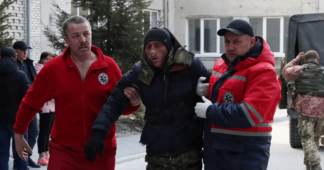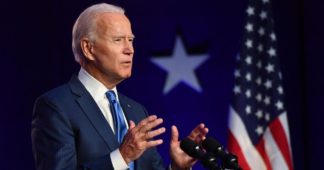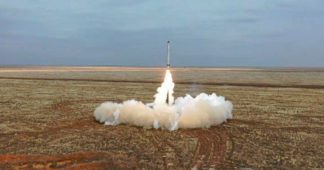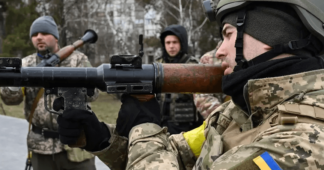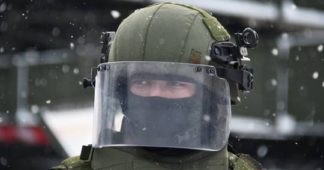Obama defense secretary Leon Panetta says NATO is in a “proxy war” with Russia
By Andre Damon
Mar 19, 2022
Leon Panetta, the former US secretary of defense and CIA director under Barack Obama and White House chief of staff under Bill Clinton, said Thursday that the United States is involved in a proxy war with Russia in Ukraine.
“We are engaged in a conflict here, it’s a proxy war with Russia, whether we say so or not,” Panetta said.
He concluded, “I think the only way basically to deal with [Russian President Vladimir] Putin right now is to double down on ourselves, which means to provide as much military aid as necessary.”
He added, “The way you get leverage is by, frankly, going in and killing Russians.”
Panetta’s comments came one day after US President Joe Biden announced the deployment of an additional $1 billion in weapons to Ukraine, adding to the $2.5 billion in weapons given to the country since 2014.
Biden announced that Ukraine would receive 9,000 anti-armor systems, 800 anti-aircraft systems, 7,000 small arms and 20 million rounds in ammunition.
So far, the US estimates that 7,000 Russian servicemen have been killed in Ukraine, or one in 28 troops deployed in the conflict. While the Russian army is making slow advances in parts of Ukraine, it has not managed to gain control over any of the major cities so far over the past month of fighting. The massive weapons deliveries by NATO to the Ukrainian army clearly have had an impact on the course of the war.
On Wednesday, the defense ministry of Slovakia, a member of NATO, offered to send S-300 long-range anti-aircraft weapons to Ukraine.
Russian foreign minister Sergey Lavrov said that Moscow “will not allow” the delivery of the weapons system, declaring, “We clearly said that any cargo moving into the Ukrainian territory which we would believe is carrying weapons would be fair game.”
Lavrov’s comments reinforce the dangers of the “proxy” conflict over Ukraine spilling over into a direct war between Russia and NATO members, which could trigger, via Article 5 of the NATO treaty, a full-scale war.
This week, the US deployed two Patriot Missile batteries on the border with Poland.
On Thursday, UK Defense Secretary Ben Wallace announced that the UK would also deploy a medium-range anti-aircraft system in Poland.
Amid rumors that Ukraine and Russia were nearing a diplomatic agreement to end the war, the US on Thursday made clear that it would not accept a diplomatic solution. Secretary of State Antony Blinken said, “The actions that we’re seeing Russia take every single day, virtually every minute of every day, are in total contrast to any serious diplomatic effort to end the war.”
He concluded, “We have a strong sense of what Russia could do next… We believe that Moscow may be setting the stage to use a chemical weapon and then falsely blame Ukraine to justify escalating its attacks.”
The United States is meanwhile flooding its European allies with weapons. “European governments have approached the U.S. government and defense contractors with a shopping list of arms including drones, missiles and missile defenses as the Russian invasion of Ukraine drives renewed demand for U.S. weaponry,” Reuters reported.
Germany is in a massive buying spree of weapons as it abandons all restraints placed on its military in the aftermath of its horrific crimes during the Second World War. The country has announced plans to buy 35 F-35 fighter jets from the US, and Reuters reports that Berlin is also considering purchasing a US missile-defense system. Poland has plans to purchase reaper drones from the United States.
Reuters reported that “The potential for a surge in sales of all types of weaponry since the invasion began Feb. 24 has lifted Lockheed stock 8.3 percent and Raytheon shares 3.9 percent.”
The conflict is accelerating the already massive US arms trade. This week, the Stockholm International Peace Research Institute published its annual global arms trade report, concluding that the US was by far the world’s largest arms exporter.
The journal Forbes commented: “For the five years from 2017 to 2021, the U.S. accounted for 39 percent of major arms deliveries worldwide, over twice what Russia transferred and nearly 10 times what China sent to its weapons clients. In addition, the U.S. had far more customers – 103 nations, or more than half of the member states of the United Nations.”
Under conditions in which massive quantities of weapons are being poured into an active and bloody conflict, there are growing warnings of a full-scale war, alongside unhinged demands for escalation to the brink of the abyss.
“This Is How World War III Begins,” declared New York Times columnist Bret Stephens. He meant this as a demand not for de-escalation, but for a more aggressive US military intervention into the conflict.
Stephens wrote:
“Refusing to impose a no-fly zone in Ukraine may be justified because it exceeds the risks NATO countries are prepared to tolerate. But the idea that doing so could start World War III ignores history and telegraphs weakness. Americans squared off with Soviet pilots operating under Chinese or North Korean cover in the Korean War without blowing up the world. And our vocal aversion to confrontation is an invitation, not a deterrent, to Russian escalation.”
This week, Martin Wolf of the Financial Times warned, “The hope for peaceful relations is fading. Instead, we have Russia’s war on Ukraine, threats of nuclear Armageddon, a mobilised west, an alliance of autocracies, unprecedented economic sanctions and a huge energy and food shock. No one knows what will happen. But we do know this looks to be a disaster.”
Wolf concluded: “Russia’s war on Ukraine has similarly transformed the map of our world. A prolonged bout of stagflation seems certain, with large potential effects on financial markets. In the long term, the emergence of two blocs with deep splits between them is likely, as is an accelerating reversal of globalization and sacrifice of business interests to geopolitics. Even nuclear war is, alas, conceivable.”
Despite these warnings, there are demands for further US escalation. The Hill reported that “a growing number of lawmakers are pressing the Biden administration to fulfill Kyiv’s request for more air power.”
The Hill added, “The discussion has transcended the partisan divisions routine to Washington, pitting the White House against not only Republicans, but also some of President Biden’s closest Democratic allies.”
There are, moreover, indications that the conflict is taking on an increasingly global dimension. Meeting with Chinese President Xi Jinping on Friday, Biden demanded that China pledge not to provide “material support to Russia,” and threatened “consequences” if it refused to make such a pledge.
Xi, for his part, condemned the US response to the war, stating, “Sweeping and indiscriminate sanctions would only make the people suffer. If further escalated, they could trigger serious crises in global economy and trade, finance, energy, food and industrial and supply chains, crippling the already languishing world economy and causing irrevocable losses.”
Republican Senator Marco Rubio declared that “China is complicit in Russia’s war on Ukraine,” demanding that “Xi and the CCP pay a price.”
The conflict that has erupted with the Russian invasion of Ukraine, according to Trump Administration National Security Council member Matthew Pottinger, is a “hot opening salvo in a cold war pitting Washington and its allies” against Russia and China. Pottinger concluded, “What we have to do is double our defense spending immediately.”
Published at www.wsws.org
We remind our readers that publication of articles on our site does not mean that we agree with what is written. Our policy is to publish anything which we consider of interest, so as to assist our readers in forming their opinions. Sometimes we even publish articles with which we totally disagree, since we believe it is important for our readers to be informed on as wide a spectrum of views as possible.
